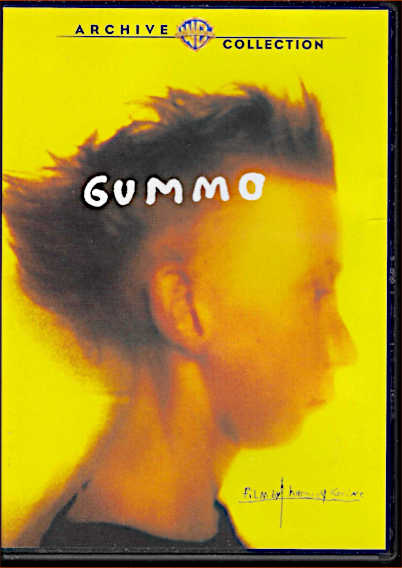Gummo

08/23/24
"Life is great. Without it, you'd be dead."
Gummo is a movie about dysfunctional people in rural Ohio. Poverty is omnipotent, and local infrastructure is in ruins. Entertainment in this place is inhalants, beer, bartered sex, animal abuse and the like. Additionally, Gummo is one of my favorite films.
Besides centering around two "main" characters - adolescents Tummler and Solomon - Gummo does not have a traditional narrative structure. If we're talking about the hero's journey, then this a film that catches its cast all in the separation phase, and stays there for the rest of the runtime. Rather than indicate radical development for anyone, motion is conveyed by a series of static exposures. Candidly, the internal scenario of key characters is elaborated on over time. Each rest in a personalized derivative of shared decline, and do not actively shift.
The revelatory advancement is the consequence of time here. The experience of years in this place is worn by the characters, reflected back on, and succumbed to. Siblings leave town and become strangers; parents die in tornados; pets are lost and never found; disease turns objectified bodies into worthless icons. As a film about day-to-day life, a fluid, even narrative would dampen the point I feel is trying to be illustrated. No author has chased any protagonist into a tree to throw rocks at them. No one has tried to get anyone to build character.
No damage is measured out for an explicitly fictionalized individual. Rather, Gummo does not design injury itself as much as it just stumbles into Xenia, Ohio with a video camera. It stumbles into a community that has spent years having rocks thrown at it - from all sides, gender and age non-discriminating - to say nothing itself and not turn away, no moral included. If it does not show all, you see more than enough to get the point.
Gummo is probably a real situation. Xenia, Ohio really was ransacked by a tornado in the 1970s. Addiction, hoarding, sex trafficking, and animal cruelty - among other things - may exist in tangent somewhere. I grew up in the middle of nowhere myself, and I saw some of these things overlap. It happened in my immediate locality, in my immediate family. Above all else, however, one experience Gummo exemplifies that I really resonate with is the first-person sense of (rural) invisibility: alienation nurtured both by geographical remoteness, and a barren, hostile culture.
I don't feel that it is what is explained as loneliness. This is not a sense of missing or really wanting something, unless it's to continue being alone, as much as it may be simultaneously resented. This is partly because isolation is what one knows, and partly because it is often the lesser evil where all available options are evil. This is a very intimate feeling, and you don't need addiction, hoarding, sex trafficking, and animal cruelty to have it, I tell you what.